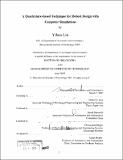A quadrature-based technique for robust design with computer simulations
Author(s)
Lin, Yiben
DownloadFull printable version (6.515Mb)
Other Contributors
Massachusetts Institute of Technology. Dept. of Aeronautics and Astronautics.
Advisor
Daniel D. Frey.
Terms of use
Metadata
Show full item recordAbstract
This thesis presents a method for estimating transmitted variance to enable robust parameter design in computer simulations. This method is based on the Hermite-Gaussian quadrature for a single input. It is extended to multiple variables, in which case, for simulations with n randomly varying inputs, the method requires 4n + 1 samples. For situations in which the polynomial response is separable, it is proven that 1) the method gives exact transmitted variance if the response is up to a fourth-order separable polynomial response and 2) the error of the transmitted variance estimated by the method is smaller than zero if the response is a fifth-order separable polynomial response. For situations in which the polynomial response is not separable, two probability models based on the effect hierarchy principle are used to generate a large number of polynomial response functions. The proposed method and alternative methods are applied to these polynomial response functions to investigate accuracy. For typical populations of problems, it is shown that the method has good accuracy, providing less than 5% error in 90% of cases. (cont.) The proposed method provides much better accuracy than Latin Hypercube Sampling or Hammersley Sequence Sampling assuming these techniques are also restricted to using 4n + 1 samples. Hammersley Sequence Sampling requires at least ten times the number of samples to provide approximately the same degree of accuracy as the quadrature technique. A cubature method provides slightly better accuracy than the proposed method, though it requires n2 + 3n + 3 samples. As an independent check on these results, simulations of five engineering systems are developed and 12 case studies are conducted. Although the predicted accuracy in case-based evaluations is somewhat lower, the data from the case-based evaluations are consistent with the results from the model-based evaluation.
Description
Thesis (Ph. D.)--Massachusetts Institute of Technology, Dept. of Aeronautics and Astronautics, 2007. Includes bibliographical references (p. 73-76).
Date issued
2007Department
Massachusetts Institute of Technology. Department of Aeronautics and AstronauticsPublisher
Massachusetts Institute of Technology
Keywords
Aeronautics and Astronautics.